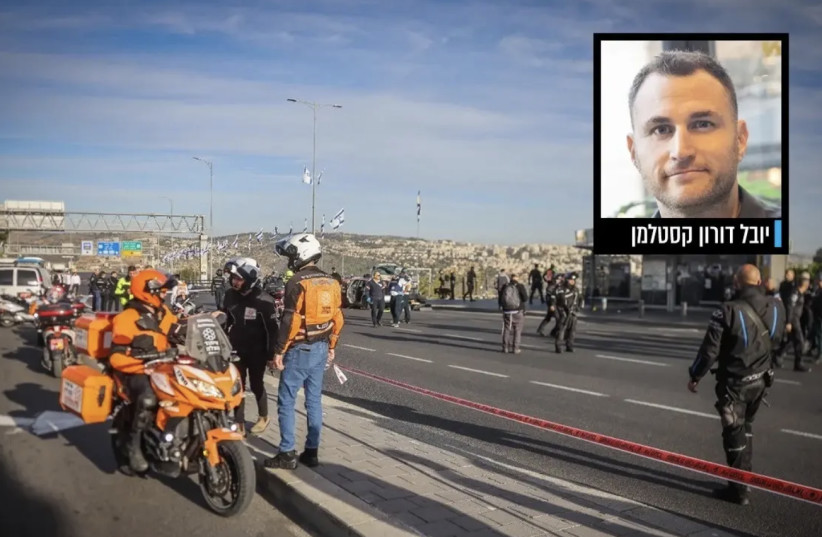IDF reservist Sgt. (res.) Aviad Frija, who shot dead Israeli civilian Yuval Doron Castleman – who himself had killed two Hamas terrorists in Jerusalem before raising his hands to plead for his life – was arrested overnight on Monday.
Frija had been allowed to walk free since the incident on Thursday, and it is still unclear whether he will be prosecuted and under what charges, as he claims he believed Castleman was a terrorist who still posed a threat.
However, evidence on the scene and documentation of the event is very much against him.
To date, public statements from top defense officials have not condemned him to anywhere near the same degree as the “Hebron Shooter,” Elor Azaria, after he shot and killed a neutralized Palestinian who was lying on the ground in 2015.
During the incident on Thursday, four people were killed and four others were wounded in a shooting attack at the entrance to Jerusalem.

Testimonies from lawyers in soldier's murder
When three of the victims were killed by two Hamas terrorists, Castleman – Israeli civilian and an attorney from Mevaseret Zion with a background in the security services – responded, and along with Israeli security forces on the scene, shot and killed the two terrorists.
In security camera footage, Castleman can be seen dashing with his gun from the other side of the road and shooting at the attackers. Frija then aims at Castleman.
Castleman kneels, raises his arms as a sign of surrender, and then opens his shirt before Frija shoots him.
Frija and another soldier involved were finally questioned under caution overnight, although the police and the prosecution have still not selected a potential charge.
In past cases where IDF soldiers killed Palestinians while breaking the rules of engagement, such as shooting someone who has surrendered, the charges have traditionally not been murder, but either manslaughter, second-degree murder, or even mere negligent homicide.
Whereas murder can carry a life sentence, or at least several decades of imprisonment, manslaughter convictions of IDF soldiers have often carried sentences of under two years or even one.
Negligent homicide convictions have carried sentences of just weeks to several months.
Despite the seemingly airtight video evidence that Frija shot Castleman while his hands were raised, The Jerusalem Post understands that Frija is claiming that after Castleman raised his hands, he made other suspicious movements with them.
Though Frija consented to a polygraph test, the investigation so far has uncovered significant gaps between the soldier’s testimony and evidence found at the scene of the shooting.
According to Frija’s lawyers, Col. (res.) Shlomi Tzfouri and Col. (res.) Ran Cohen Rochverger, who was the former chief military defense attorney, the footage published on social media was not reflective of the actual situation.
“The video clips from the scene of the attack that were published on social networks, and their camera angles, create a partial and erroneous impression which does not reflect what is seen and heard from the direction of the fighter. The additional shooting by the fighter and [the understanding of the vantage point of the] other people in the area toward the late Yuval must be examined according to all the circumstances, and the situation presented to the soldier in real-time,” they said.
Further, they said that, “from where the fighter was standing, from the sights he saw and the sounds he heard, the fighter was convinced with all his heart that he was firing at a terrorist who still posed a life-threatening danger to him and to everyone around him. He had no intention of carrying out an illegal ‘extra-judicial killing,’ and this was not how he acted. Immediately after he saw that the person was wounded and on the ground, he stopped shooting.
“After hearing the fighter’s testimony, we have no doubt that under these unusual, extreme circumstances, the Military Advocate General’s Office will also reach the clear conclusion that with all the heavy sorrow from the terrible result, this is a tragic mistake that does not justify taking criminal actions against the fighter,” they concluded.
Meanwhile, Rabbi Amichai Eliyahu, Israel’s heritage minister, called on Israeli security forces to gun down all terrorists encountered at the scene of terrorist attacks, doubling down amid a debate following Thursday’s friendly-fire incident.
Asked by Ynet whether, following the killing of Castleman, he would like to change his public call, Eliyahu responded: “We must get to a point of checking the death [of the terrorist]; we must move toward terrorists being killed and deterred.”
Tal Spungin contributed to this report.
